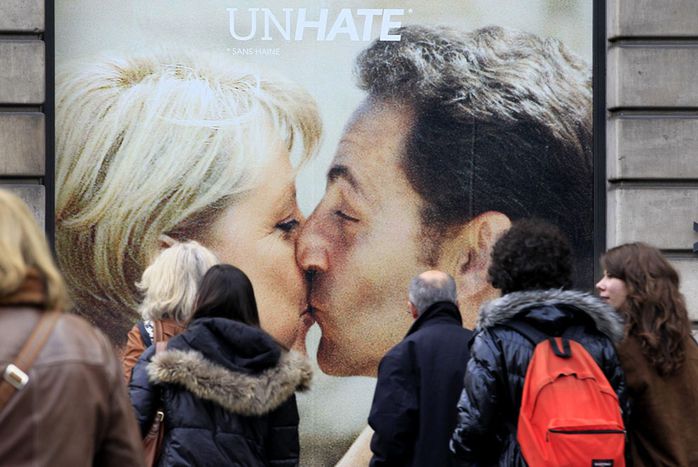
Nicolas Sarkozy and Angela Merkel : Paris-Berlin (II)
Published on
The tense relationship between Nicolas Sarkozy and Angela Merkel seems to have relaxed somewhat following the compromise over the «Mediterannean Union». Nevertheless the two leaders continue to give the impression of indulging in battle and seem incapable of reviving the Franco-German axis.
Too gaulish a vision of the mare nostrum
Incompatibilities of temperament are not the only culprits in this matter and they do not quite mask the fundamental differences which exist, most notably on the topic of the Mediterranean Union project, launched to the blare of trumpets under the initiative of the sovereignist Henri Guaino, special councillor to the French President, which the Germans consider a geopolitical prank. If they share the diagnosis that the Barcelona process was a failure (launched in 1995 to provide a framework for the relationship between the European Community and Mediterranean countries), they refuse to validate the proposition of a Union which would replace it and be reserved exclusively for countries bordering the Mediterranean. Here they detect the risk of a division in the EU and a strategy for bypassing it as this new structure, while giving France a driving rôle, would also exclude Germany and all the countries of Northern Europe by de facto. However, it is important to understand that the reunified Germany, in an expanded Europe, has, in a certain way, refound power and experienced a strategic rebalancing which is unfavourable for France. The former is better inserted into the global economy thanks to its industrial network of small, good quality businesses which export well (to see this it is enough to compare the two countries' levels of external trade).
This state of affairs is undoubtedly not unrelated to Angela Merkel's «victory», with the support of the European Commission, and also the flip side of what she inflicted on Nicolas Sarkozy over the Mediterranean file at the time of the European summit in Brussels of last March 15/16th. The construction site of that which will from now on be called the «Union for the Mediterranean», will therefore be a renewed framework for the Barcelona process, a «Barcelona plus» as put bluntly by the Prime Minister of Luxemburg, J.C. Juncker, in which all the countries of the EU will have a vocation to actively participate.
In the meantime, it is with a certain geostrategic tactlessness that, in the same breath as his disagreement with Berlin, Nicolas Sarkozy turned to the United Kingdom to celebrate a convergence of political viewpoints. The relative failure of this circumstantial manoeuvre, in the face of a country which remains fiercely insular, has once again highlighted the French President's slip up, wishing to appear to turn his back on the Franco-German cooperation and seek rebalancing elsewhere.
Imagination in power!
Beyond the relationship between the two personalities, one can still take comfort in noting that at a structural level (governmental, ministerial, administrative) continuity is guaranteed by the regular exchanges and meetings which have already been introduced, of which the Franco-German summit of last June 9th is an example; partnerships are also pursued at the level of civil society. However, there is also a problem here: a difficulty in placing the Franco-German relationship and of envisaging it in a dynamic role in an expanded Europe and at the heart of a globalised economy. There also remain the stinging reproaches of certain Europeans against the FrancoGerman couple for failing to meet propositions themselves, but for always being there to call others to order and to monopolise on their special rights as joint founders.
On this unsure playing field, it therefore falls to two people who seem to be allergic to each other to quickly find their marks, so as to allow conditions to be put in place which can renew their common perspective. The two leaders should be capable of being pragmatic when dealing with this case; for evidence of this one can look (with a degree of amusement) at how easy it was for Nicolas Sarkozy to let it slide when Angela Merkel was awarded the Charlemagne prize for her European engagement with great pomp on May 1st in Aix-en-Chapelle. The French President, completely at ease, praised the Chancellor almost lovingly, who in return rose to the occasion by addressing Sarkozy in a personal manner, trying to outdo her adulator.
Nevertheless, pragmatism alone will not revive the Franco-German axis. What it needs is a smidgeon of idealism, a dash of sincere desire, it needs strength and the enthusiasm of imagination. It is exactly this which is lacking from each of these two characters, locked in a rivalry to be European leader and having absolutely no warmth for each other. It is as a result of this that in this field the «enlightened civil society» has a duty to make a decisive difference.
JCL
Translator: Christina G Connolly



